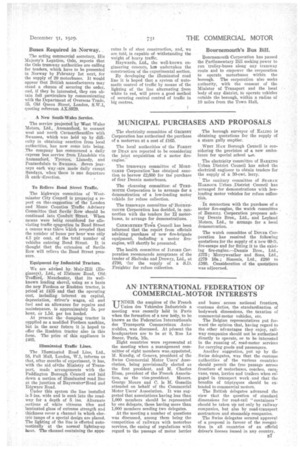AN INTERNATIONAL FEDERATION OF COMMERCIAL-MOTOR INTERESTS
Page 41

If you've noticed an error in this article please click here to report it so we can fix it.
TTNIIER the auspices of the French lJ Union des Vehicules Industriels meeting was .recently held in Paris when the formation of a new body, to be known as the Federation Internationale dos Transports Commenciaux Automobiles, was discussed. At piesent the headquarters are to be at 9, Rue Le Sueur, 'Paris, 16e.
Bight countries were represented at the meeting when a management committee of eight members wasrappointed, M. Kundig, of Geneva, president of the Swiss Commercial Motor Users' Association, being provisionally elected as the first president, and M. Charles Blum, president of the French Association, as the vice-president. Messrs. George ?donna and C. le M. Gosselin attended on behalf of the Commercial Motor Users' Association. It was suggested that associations having less than 1,000 members should be represented by one delegate, those having 'morethan 1,000 members sending two delegates.
At the meeting a number of questions was discussed, among them being the 'competition of railways with motorbus services, the easing of regulations with regard to the passage of motor lorries and buses' across national frontiers, -.customs duties, the standardization of bodywork dimensions, the taxation of commercial-motor vehicles, etc.
The Belgian representatives put forward the opinion that, having regard to the other advantages they enjoy, railway companies should not be authorized directly to operate, or to be interested in the running of, road-motor services for carrying goods and passengers.
Another suggestion, put up by the Swiss delegates, was that the customs authorities of the various countries should permit the free passage across frontiers of motorbuses, coaches, cardvans, vans, lorries and trailers when engaged in transport work 'and that the benefits of triotyques should be extended to Commercial motors.
The British delegates advanced the view that the question of standard dimensions for road-rail "containers" should be taken up not only by railway companies, but also by road-transport contractors and steamship companies.
The Swiss delegates secured approval of a proposal in favour of the recognition in all countries of an official driver's 'licence issued 'in any country.




































































































